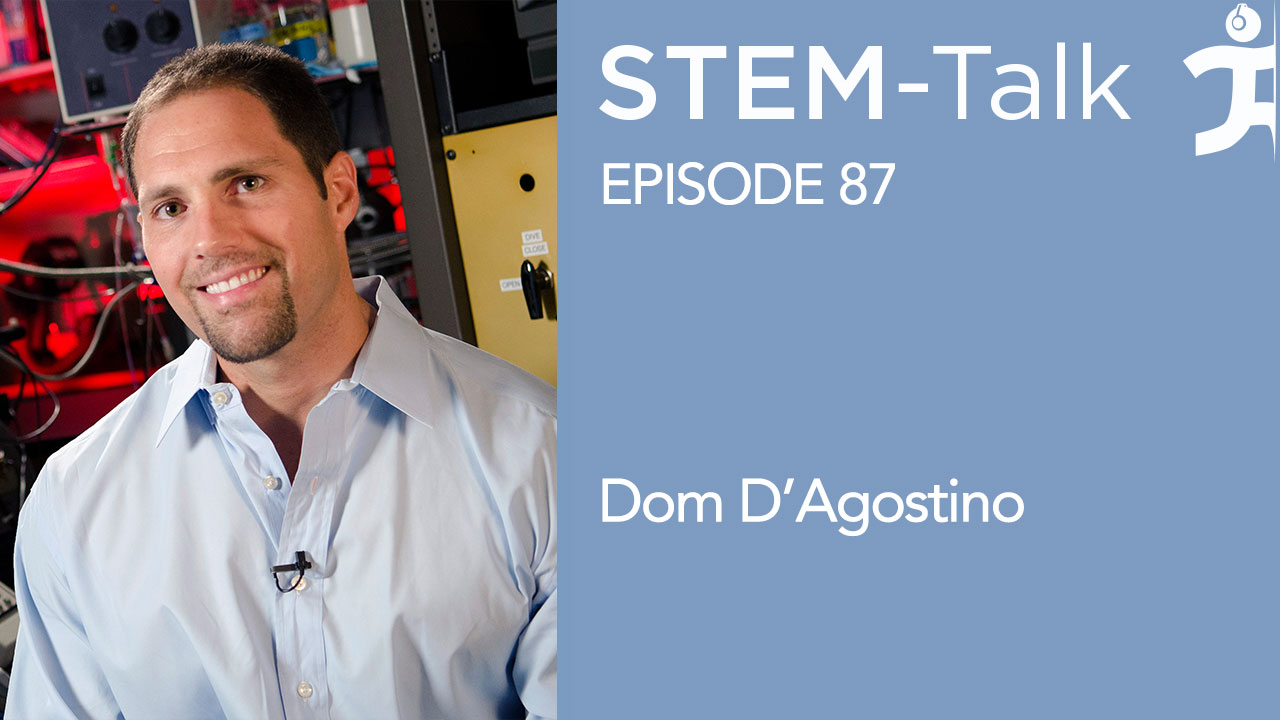STEM-Talk
Episode 87: Dom D’Agostino reflects on his 10 years of research into ketogenic nutrition
// Apr 23, 2019

Dr. Dominic D’Agostino returns to STEM-Talk to give Ken and Dawn an update on his research into ketogenic nutrition. Dom was the guest on episode 14 back in 2016 when ketogenic diets didn’t even show up on a list of the top-10 diets that people Googled. Since then, the search term “ketogenic diet” has risen to the top of the list.
In today’s episode, Dom talks about his past 10 years of research into ketogenic diets and what he is learning about the physiological benefits of nutritional ketosis.
Dom is tenured associate professor in the Department of Molecular Pharmacology and Physiology at the University of South Florida Morsani College of Medicine.He also is a research scientist here at IHMC.Throughout his career, Dom has been a researcher with a diverse background in neuroscience, molecular pharmacology, nutrition and physiology.
Show notes:
[00:02:55] Dawn begins the interview mentioning that when she and Ken started hosting STEM-Talk, the ketogenic diet wasn’t on the list of the top-10 most Googled diets of 2015. Today, however, Dawn points that ketogenic diet is number one on the list. She asks Dom if he foresaw sudden mass interest in a ketogenic diet coming. [00:04:12] Ken asks Dom for his thoughts on how the ketogenic diet has went from being very obscure to becoming a household term. [00:06:04] Ken comments on the evolutionary component of the ketogenic diet and how our ancestors must have gone in and out of ketosis based on the availability of food. He also comments on the unique aspect of the ketogenic diet, being that it has an objective measurement, and asks Dom to talk about that. [00:06:59] Dawn comments on the cynicism regarding the ketogenic diet, particularly from nutritionists. She asks Dom to address the criticism and pushback that the ketogenic diet receives from so many nutritionists. [00:10:02] Ken mentions that some fields are resistant to change and new science due to the emotion behind established theories. Dom agrees and then talks about how people, even doctors, are resistant to new data and new science. [00:11:13] Dom talks about the most common misconceptions and overrepresentations of the ketogenic diet. [00:12:54] Ken discusses his dissatisfaction with the term “ketogenic diet” since the word diet implies the mandated consumption of certain food items. He goes on to say that if one is in ketosis, then, by definition, they are doing a ketogenic diet, even though they may be in ketosis because they have been fasting and haven’t eaten anything. Ken and Dom discuss how knowledge about ketogenic nutrition has changed over time and that it is certainly possible to eat an unhealthy ketogenic diet. [00:15:35] Dom and Ken talk about the results of a recent Megan Roberts paper, “A Ketogenic Diet Extends Longevity and Healthspan in Adult Mice,”that showed a 13% increase in the lifespan of the mice along with remarkably improved healthspan. [00:20:26] Dom shares his thoughts on the potential of exogenous ketones in the context of blood glucose regulation. [00:27:07] Ken asks if Dom has been tracking Virta Health, which was founded by Dr. Jeff Volek who was interviewed in STEM-Talk episode 43. Virta Health has been publishing impressive results of its trials that show people reversing type-2 diabetes via a well-formulated ketogenic diet. [00:29:13] Ken adds that the reported numbers from Virta show 60% to 70% of their patients going off their insulin medication or greatly reducing their insulin levels. [00:30:55] Dawn asks about Dom’s experience going underwater for 10 days in participation of a NASA NEEMO mission. She asks him to talk about his personal experience as well as his background in hyperbaric physiology. [00:32:08] Dom discusses his group’s work replicating the experimental design of his original oxygen toxicity work in aged and obese rats. [00:33:35] Dawn briefly describes what oxygen toxicity is, and asks Dom about the first human studies, on which he is serving as a consultant, that are being conducted at Duke University to assess the effect of nutritional ketosis on oxygen toxicity and seizure risk. She points out that the studies that are being run by Dr. Bruce Derrick. [00:36:36] Dom discusses brain energy metabolism, and cerebral metabolism, in the context of ketone bodies. [00:39:23] Dom talks about his group’s research into kabuki syndrome, an epigenetic disorder that causes altered growth and cognitive dysfunction in children. [00:42:02] Dom elaborates on the difference between ketone esters and ketone salts. [00:44:00] Ken asks if there’s any evidence that people experience medical issues as a result of ketone esters or salts. [00:48:02] Dawn asks about the transition into ketosis for women, which appears to be more difficult than it is for men, and whether the use of exogenous ketones would be a good option for women. [00:49:43] Dawn asks if there are any more resources that have been generated on a vegetarian ketogenic diet, since the last time she and Dom discussed it on STEM-Talk. [00:50:41] Ken asks about the differences between a ketone tolerance test and a glucose tolerance test. [00:53:36] Ken discusses how some research suggests that anaerobic athletes such as wrestlers, boxers, and MMA fighters will experience a dip in performance on a ketogenic diet. He asks what the state of research is on this topic, and how such athletes can modify their fueling to obtain the benefits of the ketogenic diet (such as brain protection) while maximizing their performance. [00:56:57] Dom discusses the ketogenic diet in relation to the gut microbiome, and the resolving of long-term GI issues for people who go on the ketogenic diet, as well as the study coming from the Sonnenberg lab at Stanford. [00:59:58] Dom talks about his group’s exploration of an ecological idea of cancer treatment based on the ecological concept of animal extinction. [01:02:37] Dom talks about his collaborative paper, written with his Ph.D. student, Andrew Koutnik, and Brendan Egan, titled, “Anti-catabolic Effects of Ketone Bodies in Skeletal Muscle.” [01:05:11] Dawn asks about Dom’s research on cancer cachexia, and what spurred his interest in this topic. [01:07:05] Dawn asks what targets people should shoot for on a ketogenic diet with regards to their electrolytes, and to describe the signs and symptoms of inadequate electrolytes. [01:09:31] Ken asks what experiences stick out to Dom, as he reflects on the last 10 years of his scientific journey. [01:12:11] Dawn asks about Dom and his wife’s new dog and their farm. [01:14:15] Ken asks about Dom’s fitness routine now that he no longer goes to a gym. [01:16:05] Dawn ends the interview asking if Dom recommends farming and gardening as a way to stay in shape.
Links:






